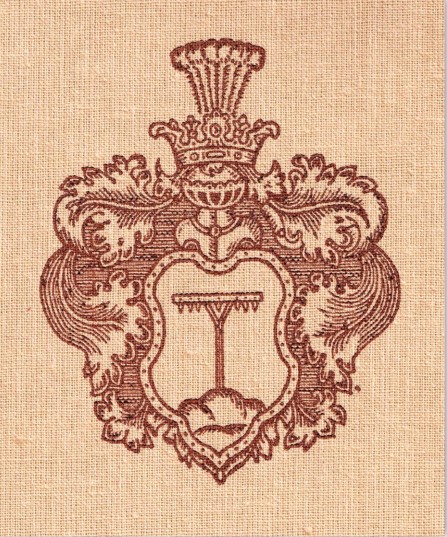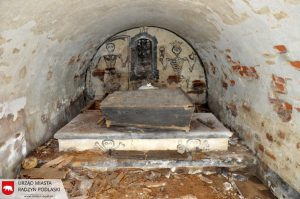Szczukowa Konstancja Marianna, née Potocka

Konstancja Marianna Szczukowa, née Potocka
Parents: Bogusław Potocki (d. before 1693), and Teofila Helena Męcińska
Husband: (from 6 II 1695 r.) Stanisław Antoni (d. 19 V 1710)

Crypt under the church of Holy Trinity in Radzyń Podlaski – burial place of Konstancja Szczukowa
Konstancja Marianna Szczukowa, née Potocka married on February 6, 1695. At the time she was a lady-in-waiting at Maria Kazimiera’s court. The couple had three sons – August Michał (September 29, 1697-1702), Marcin Leopold (November 13, 1698-1728), and Jan Kanty (died 1724), who all died childless at a young age, and two daughters – Wiktoria (December 23, 1701-1735) and Maria Anna (1703-1705). The aforementioned Wiktoria became the sole heir of the family estate at Szczuków, which then passed on to her daughter (and granddaughter of Stanisław Antoni) – Marianna Potocka, née Kątska. The Szczukas were seen as a happy marriage. Stanisław Antoni Szczuka held important offices in the Commonwealth, which is why he sought help in administering his goods, especially in his absence, from his wife and officials subordinate to him.
The Court
The founder of the family’s power was undoubtedly Stanisław Antoni, who came from the wealthy Lithuanian Szczuka family. He was educated in Vilnius with Hieronim Kryspin-Kirszensztein (died after 1676), the Treasurer of Lithuania. The family estate included property brought into the marriage primarily by Stanisław Antoni. It was his share of the inheritance from his parents, i.e. the council property in Upita (modern Upytė) county. In the 1680s, Szczuka began to collect lands in the region of Wizna, where he intended to establish the main seat of his family. In the period between 1689 and 1692, in accordance with his will, the city of Szczuczyn was set up, which would over time become the seat of the family. It was there that Stanisław Antoni founded a Piarist College in 1696. At the same time, he also received the city of Radzyń, located in the Lublin Voivodeship, from King John III (as a perpetual lease) and enriched himself significantly after taking over the inheritance from Adam Kotowski, who died in 1693 and had been the Pantler of Wyszogród and the superintendent of crown duties. For his wife, Stanisław Antoni acquired, in 1700, Sidra, which he took over after the death of his uncle Krzysztof Potocki (died 1683), the Starost of Jabłonowo. An important component of the Szczuka family fortune were also royal lands, which gave them broader opportunities to manage hereditary estates. These properties were greatly dispersed, as they were located in over a dozen provinces. However, most of them were in Mazowsze, Podlasie, and Samogitia, as well as the Lublin and Troki regions. That was where Szczuka’a private estates were also located, as well as the royal lands around Szawle (modern Šiauliai), which officially belonged to prince Jacob, but were administrated by Stanisław Antoni. It is worth noting that some of the couple’s property was also brought in by Konstancja Marianna, whose dowry amounted to 140 thousand złoty along with
bequests from King John III and her guardian, Anna Stanisławska, née Potocki. In addition, the spouses provided each other with life tenancy, as a precaution against widowhood. The financial base of the Szczuka household was first of all farming and livestock, which guaranteed self-sufficiency of the estates, while profits derived from the sale of any surpluses were spent on necessary investments. Food processing also played an important role, especially the production of alcohol (vodka and beer), beekeeping, and forestry (wood, tar, potash), as well as fishing, for which ponds were specially created. Sources, however, are more quiet on the subject of industry in their estates. They have more to say about trade and import of goods, mainly from Wrocław, Lublin, Zamość, Gdańsk, or Królewiec.
See also:
Kicińska U., Patronacka aktywność wdowy Konstancji Marianny z Potockich Szczukowej podkanclerzyny litewskiej, [w:] W kręgu patronatu kobiecego w XVII-XVIII wieku, red. B. Popiołek, U. Kicińska, A. Penkała-Jastrzębska, A. Słaby, Kraków 2018, s. 221-237/ [eng]Patron’s activity of the widow Konstancja Marianna Szczukowa, née Potocka Lithuanian deputy chancelloress LINK
Kicińska U., Political activity of widows as an example of shaping cliental dependencies in the second half of the seventeenth and eighteenth centuries, “Theatrum Historiae”, 2019, nr 24, s. 41-53. LINK
Popiołek B., Kobieta zaradna. Konstancja Marianna z Potockich Szczukowa, podkanclerzyna litewska, [w:] Słynne kobiety w Rzeczypospolitej XVIII wieku, red. A. Roćko, M. Górska, Warszawa 2017, s. 21-40.
Patronat Konstancji z Potockich Szczukowej
Grochowska I., Stanisław Antoni Szczuka – jego działalność w ziemi wiskiej 1682-1710, Warszawa 1989
https://radzyn-podl.pl/miasto/z-kart-historii/1570-krypty.html
 Women's noble court in the Polish-Lithuanian Commonwealth in the Saxon times. Structure, people, culture, functions
Women's noble court in the Polish-Lithuanian Commonwealth in the Saxon times. Structure, people, culture, functions
